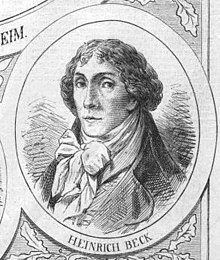Heinrich Beck (actor)
Heinrich Christian Beck (born February 19, 1760 in Gotha ; † May 7, 1803 in Mannheim ) was a German actor and playwright.
Life
Beck began his theatrical career together with August Iffland and Johann David Beil at the Hoftheater in Gotha and after the dissolution of the theater in 1779, like most of the ensemble, went to the Mannheim National Theater , which at that time experienced an artistic boom under Wolfgang Heribert von Dalberg's direction. Beck took part in the premieres of Schiller's first plays Die Räuber (as Kosinsky) and Fiesco (as Bourgognino).
In 1799, Elector Maximilian IV Joseph of Bavaria appointed him as a director in Munich . From there he returned to Mannheim as theater director in 1801, where he died in May 1803.
Beck was known for his acting skills and his good voice and moved with the same dexterity in comedy and tragedy as in the Singspiel .
Among his own plays, the comedy Die Schachmaschine (Berlin 1798), Die Quälgeister (an adaptation of Shakespeare's Much ado about nothing ; Frankfurt 1802) and Das Kamäleon (Frankfurt 1803) received the most applause. His dramatic work appeared under the title "Theater" in 3 volumes from 1802 in Frankfurt.
Beck's first wife Karoline, née Ziegler (born January 3, 1766 in Mannheim), a talented, promising actress, made her debut in Mannheim in 1781, but died on July 24, 1784. Friedrich Schiller , to whom she played his Luise in Kabale und Liebe had floated showed her special affection.
With his second wife, the singer and actress Josefa Beck (unknown – 1827), he had the daughters Louise Beck (1789–1857), actress and playwright, and Auguste Beck (1793 – 1827 at the earliest), singer (soprano).
literature
- August Förster : Beck, Heinrich . In: Allgemeine Deutsche Biographie (ADB). Volume 2, Duncker & Humblot, Leipzig 1875, p. 213.
- Hans Knudsen: Beck, Heinrich Christian. In: New German Biography (NDB). Volume 1, Duncker & Humblot, Berlin 1953, ISBN 3-428-00182-6 , pp. 701 f. ( Digitized version ).
- Hans Knudsen : Heinrich Beck, an actor from the heyday of Mannheim theater in the 18th century . Voss, Leipzig / Hamburg 1912
Web links
- Literature by and about Heinrich Beck in the catalog of the German National Library
See also
| personal data | |
|---|---|
| SURNAME | Beck, Heinrich |
| ALTERNATIVE NAMES | Beck, Heinrich Christian (full name) |
| BRIEF DESCRIPTION | German actor and playwright |
| DATE OF BIRTH | February 19, 1760 |
| PLACE OF BIRTH | Gotha |
| DATE OF DEATH | May 7, 1803 |
| Place of death | Mannheim |

